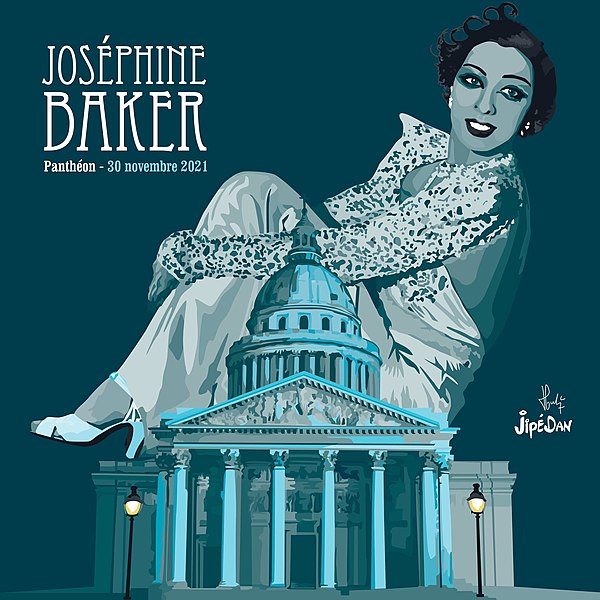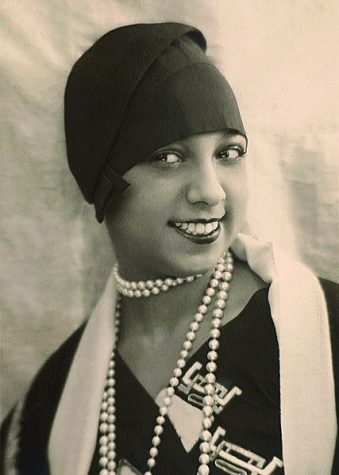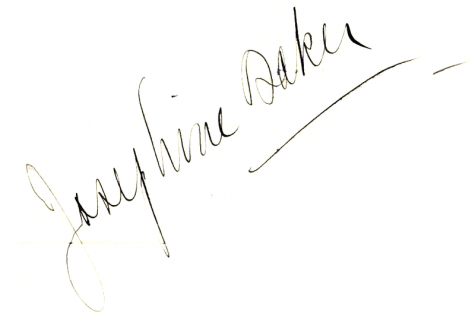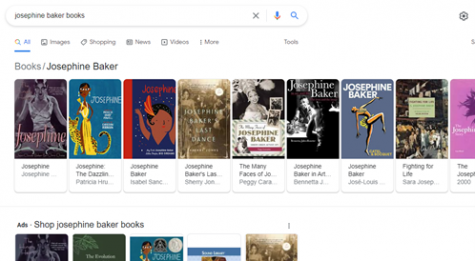France commemorates Josephine Baker by giving her one of the highest honors
A look at the life of one of the greatest groundbreakers in 20th century music history

JipéDan – site Facebook, CC BY-SA 3.0
A design showcasing a digital image of Baker, along with the Pantheon, and the date of her induction.
On November 30, 2021, Josephine Baker entered the Pantheon in France, which is a monument dedicated to memorialize French men and women who have contributed in meaningful ways to French society. Baker is the third black person, and the first black woman, to enter the Pantheon. This recognition is a result of years of politicians, activists, and different organizations trying to “pantheonize” her. However, some people may not be aware of who she is, the ways in which she contributed to the civil rights movement, and what her entrance to the Pantheon signifies for black people in France, as well as what it says about France’s “universalist” approach when it comes to race. And this article hopefully serves as a way to give people a deeper understanding of the importance behind this event, as well as some appreciation for a historical figure important both in the U.S and the French republic.

Josephine Baker was an America-born singer, dancer and entertainer, who spent most of her career in France. She was born on June 3rd, 1906, in St. Louis, Missouri as Freda Josephine McDonald. Her early years were spent in poverty, resulting in a young Josephine having to work as a babysitter and housekeeper for wealthy white families. At 13, she ran away from home and started working as a waitress at a club. During this time she took up dancing as an occupation. By 1919, she was touring the United states with the Jones Family band and performing comedic skits with the Dixie Steppers. In 1921, she married Willie Baker, and despite eventually getting a divorce, she kept his name for the rest of her career. And so, the entertainer Josephine Baker was born, and her charisma and attitude aided in her raise to fame.
In 1923, after seeing some success in the musical Shuffle Along, she moved to New York City and started performing in The Chocolate Dandies. In 1925, when France’s obsession with American Jazz and so called “Exotic Things” was at its highest, Baker traveled to France and made an impression on French audiences with her performance of “Danse Sauvage” at Théâtre des Champs-Elysées, in which she only wore a feather skirt. A year after, she would achieve celebrity status after wearing a skirt made out of 16 bananas in a show called “La Folie du Jour,” becoming one of Europe’s most popular and highest-paid performers. Baker returned to America in 1936, hoping to establish herself as a performer in her home country as well, but was met with hostility, and she was forced to deal with a kind of segregation she had not experienced as a kid. Horrified at this, and longing for the feeling of acceptance France offered, she returned to the European country shortly after.

When WWII broke out, Josephine joined the fight against the Nazis and she started working with the allied and French military forces. She would often pass on secrets she heard while performing in front of the enemy, and pass on confidential information by writing with invisible ink on music sheets and even smuggling secret messages in her underwear. For her work, she was awarded the Croix de Guerre and the Legion of Honor with the Resistance Medal.
Performing and working for the French military forces isn’t all Josephine did, she also contributed to the civil rights movement and was the only woman who spoke at the March on Washington for Jobs and Freedom. Many of the organizers did not want her to speak, they thought she had become a French girl and was out of touch with the current issues the movement was dealing with. She was friends with Martin Luther King Jr, however, and her managers worked to get her on the program.
She gave a powerful speech about her childhood, her life in France and the way she felt human there, and how she couldn’t believe that the country that birthed her refused to give her the same acceptance people overseas gave her. “I have walked into the palaces of kings and queens and into the houses of presidents. And much more. But I could not walk into a hotel in America and get a cup of coffee, and that made me mad. And when I get mad, you know that I open my big mouth. And then look out, ’cause when Josephine opens her mouth, they hear it all over the world.” Baker stated. Her speech inspired everyone present at the march and continues to inspire people to this day.

Even at an older age, Josephine kept performing, a performance that is relatively well-known is her concert in Carnegie Hall in 1973, there are many recordings of it available on platforms such as YouTube. In April 1975, Baker gave one of her last performances at the Bobino Theater in Paris, in a series of performances celebrating the 50th anniversary of her Paris debut. Days after this show, Baker died of a cerebral hemorrhage in her sleep at age 68. Her legacy is still alive today and many articles, books, and videos have been made talking about her life and influence.
It is important for the general public to learn about Josephine and the role she played in the way historic events played out. After reading some information about her, first-year journalism student Jaelyn Palmer stated, “I wish I had learned about her sooner, she sounded like a great woman who pioneered a career path for other black woman and inspired a lot of people to pursue jobs in the entertainment industry.” Grace Oldenburg, also a first-year journalist and a junior at Lafayette High School said, “I bet she was an incredible person and she fought for what she believed in, whether it was for her own race or for the arts. She should definitely be taught in schools.”

Baker’s entrance to the pantheon is a great honor, and at first glance it seems like a powerful message against racism; the first black woman to enter the pantheon. However, some critics argue that France choosing an American-born figure is an example of the country’s tendency to condemn racism abroad but ignore it at home. France’s approach to race is “universalist” or “color-blind”, meaning that they do not see race and only think of themselves as members of the same country. Josephine Baker loved universalism with a passion, and often reflected on the fact that in France she felt human, whereas in the U.S she was reminded of her origin constantly. But France was not a utopia where race was ignored, and some of its past colonialist history illustrates this well.
Josephine arrived in France when the country had colonies in Africa, Southeast Asia, the Caribbean, and the Pacific. There were different legal statuses depending on where you came from, with a clear distinction between citizens and subjects. Subjects would often experience harsh taxes and punishments, and citizens of color would experience relative equality, but still experienced discrimination nonetheless. Many people argue that the acceptance and love that Baker received was due to the fact that, despite being black, she was also American, and people did not think of her as a former or current subject.
Baker’s performances were mostly enjoyed by white audiences, her outfit choices and dancing were good enough to entertain the white man yet not challenge the racial status-quo. Critics say that her reality in France was not the reality of all black people and other people of color, and by calling the country color-blind, she enabled the people in it to think that racism and discrimination does not take place in the republic, and it prevented people from evaluating their behavior and reflecting about the way black people were treated. Currently France still struggles with racism even if it isn’t talked about as much, with people of African and Arab descent, as well as Muslims, facing the most discrimination in aspects such as housing, police violence, and employment. Critics say that France could have chosen another figure to induce in the Pantheon, a French-born figure to honor in order to send a message that the history and fight of black people in France is not ignored.
Regardless of how people may feel about Josephine Baker and her induction to the Pantheon, she was still a very important person. Even though she isn’t talked about enough, she deserves recognition and to have her story told. To be the first black woman to enter the Pantheon is a great honor which will hopefully pave the way for other black French historical figures to get recognized too.



